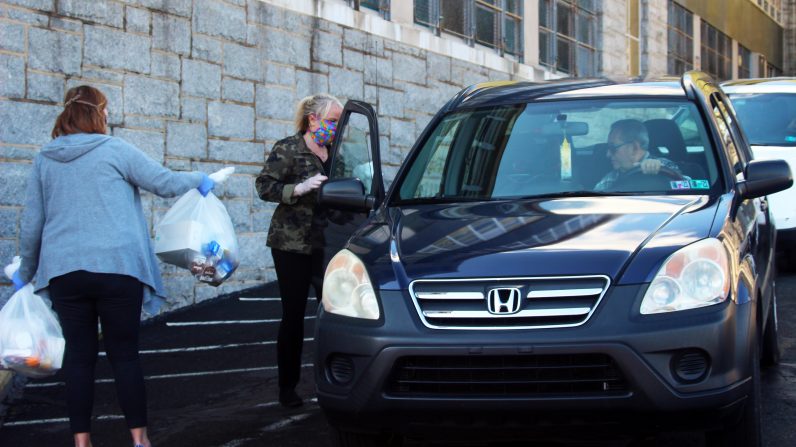
Kimberly Gatto, who manages the federally funded school breakfast and lunch program at Blessed Trinity Regional Catholic School in Northeast Philadelphia, distributes boxed children’s meals to a parent, assisted by principal Linda Milewski, April 8. Archdiocesan Nutritional Development Services, which administers the federal program at some 40 local sites, reported a 900% increase in meal distribution between March 16 and April 6 due to the coronavirus pandemic. (Photo by Gina Christian)
Archdiocesan workers have reported a 900% increase in the number of federally funded school meals they are distributing during the coronavirus pandemic.
During the week of March 16 staff at Nutritional Development Services (NDS), an agency of the Archdiocese of Philadelphia, delivered more than 2,800 free breakfasts and lunches to 12 sites. Three weeks later, the number of locations had tripled, with NDS teams supplying well over 28,000 meals.
The agency expects to provide almost 38,000 meals next week.
“It’s been ramping up,” said Erinn J. Hill, the local NDS administrator for the U.S. Department of Agriculture’s national school lunch program offered at 42 Philadelphia-area sites.
[hotblock]
Over the past 10 years, NDS — a beneficiary of the Catholic Charities Appeal — has served about 77 million meals through all of the federally funded programs it manages.
Although they’re used to such large figures, both Hill and NDS executive director Lizanne Hagedorn said the pandemic has rapidly exacerbated the need for food assistance in the area.
“We’re making deliveries twice a week, and each delivery marks an increase over the previous one,” said Hill.
Hagedorn said the City of Philadelphia has asked NDS to “help in certain areas where there wasn’t as much access to children’s meals.”
In response, she and her team have been operating at NDS’s summer feeding sites to reach underserved areas.
Hill added that the agency is also “pairing feeding sites with food cupboards we’re supporting, so families can get food staples and take home breakfast and lunch for their kids in one stop.”
That flexibility is critical to NDS’s strategy during the pandemic, Hill noted.
“This is a changing landscape, and we’re here to fill in any gaps that might occur,” she said, noting that an updated list of sites is available on the NDS website.
Meal distribution has been adjusted to comply with public health directives aimed at stopping the spread of the highly contagious coronavirus, which has infected some 1.5 million people and killed more than 93,000 worldwide.
Each site now features a “grab and go” delivery system that minimizes contact between clients and NDS workers, who wear face masks and gloves while maintaining social distancing.
Parents can collect up to three days’ worth of meals per child at a single visit, and children do not need to be present at the time of collection.
“All these things are decreasing the need for people to be out and about, while allowing greater access to food,” said Hill.
The meals themselves, which are balanced to meet USDA nutritional requirements, feature more shelf-stable items such as granola bars and fruit cups to accommodate sites without refrigeration.
Families are “grateful for the food,” said Linda Milewski, principal of Blessed Trinity Regional Catholic School in Northeast Philadelphia.
Milewski, along with a team of half a dozen NDS volunteers, donned a face mask and gloves to hand out meals at the school on Wednesday, April 8 as part of a twice-weekly drive-through distribution in the school’s parking lot.
“The breakfasts and lunches are so important, and we decided that we had to continue this even while the kids aren’t in the building,” she said.
Students who have tagged along with their parents “are very excited to see that we’re still here,” said Milewski.
Hagedorn said she was “blown away by the willingness and generosity of school managers and volunteers who are coming out” to distribute the meals.
“They feel this so deeply; there’s such a need in the communities, and the meals stretch whatever food the families have at home,” said Hagedorn. “They’re really the heroes for doing this work.”
“And for doing it so joyfully,” added Hill.
***
For a complete list of food distribution sites supported by archdiocesan Nutritional Development Services, click here.
PREVIOUS: Catholic ministries on front line of pandemic get help of civic charity
NEXT: Find a Mass livestreamed


Share this story